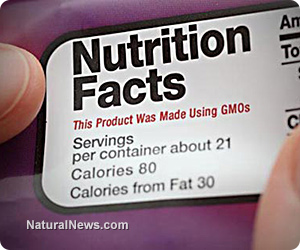It is a war for the truth, and NationalGeographic.com writer Laura Parker seems to think that the people are winning it. Awareness about the presence of genetically modified organisms (GMOs) is clearly on the rise nationwide, and in the midst of this knowledge boon comes the admission by some in the mainstream media that mandatory GMO labeling is no longer a question of if, but of when.
Numerous states have attempted to pass GMO labeling legislation in recent years, but only a few have been successful. Both California and Washington come to mind, as voters narrowly rejected two pieces of legislation, Proposition 37 in California and Initiative 522 in Washington, that would have required full disclosure of GMO ingredients in foods sold at the retail level. The states of Maine and Connecticut, on the other hand, recently passed their own respective GMO labeling bills.
While all this is going on, the Grocery Manufacturers Association (GMA), as we recently reported, is on the move to put a stop to all the labeling momentum. The pro-GMO lobbying group is in the process of submitting legislation that would make all other GMO labeling laws voluntary rather than mandatory. This same legislation would preempt any and all state laws that contradict the federal position on GMOs, according to NationalGeographic.com.
Then, we have the recent announcement from General Mills about its transition to non-GMO Cheerios, arguably the most well-known and iconic cereal brand in the country. Insistent that the move was not made out of pressure or because of safety concerns, General Mills spokesmen have been telling the media that the switch to non-GMO Cheerios was driven purely by consumer preference.
“It’s a sign of the power of the growing grassroots movement,” stated Dave Murphy, founder of Food Democracy Now, to NationalGeographic.com about this historic move by General Mills. “And a reminder that in America, the consumer is king.”
Biotechnology industry fighting tooth and nail to prevent GMO labeling laws from passing
But for the past roughly 18 years, the consumer really has not been king. GMO purveyors like Monsanto have been successful in transitioning as much as 90 percent of the nation’s most popular commodity crops — soybeans, sugar beets, corn and canola — over to GMOs, and this has all been accomplished beneath the radar without labeling.
“It could be tantamount to putting a skull and crossbones on the labels,” reads the infamous quote by an industry insider who was asked why the biotech industry has long opposed proper labeling.
But things are finally changing, and the people are making their voices heard loud and clear on the issue. And the good news is that companies like Whole Foods Market, Chipotle Mexican Grill, Ben & Jerry’s and now General Mills are beginning to phase GMOs out of their product lines in response to increasing consumer demand, which can only eventually lead to obligatory GMO labeling requirements.
“As a consumer I have a right to know what I am buying,” writes one NationalGeographic.com commenter about the issue. “If I am more concerned about the environmental and social effects of GMO agriculture (which are considerable) than the personal health effects, I still want to be able to choose. … How I spend my money is a political decision. Free markets depend on the free flow of information.”
Sources for this article include:
http://news.nationalgeographic.com











Sign up on lukeunfiltered.com or to check out our store on thebestpoliticalshirts.com.